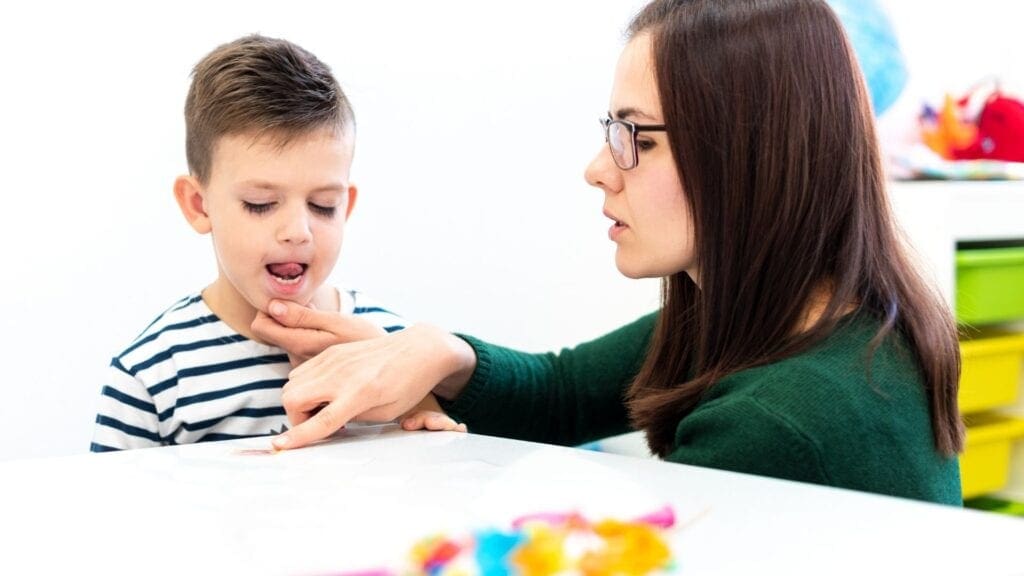
What does PROMPT stand for?
PROMPT is an acronym that stands for “Prompts for Reconstructing Oral Muscular-Phonetic Targets”.
What types of Speech Sound Disorders (SSD) could PROMPT be used for?
Good candidates for the PROMPT technique can range from children or adults who are either partially or completely non-verbal and may be using an alternative mode of communication to individuals with mild articulation delays. More specifically, PROMPT would work best for Motor-Speech Disorders and Language Disorders such as:
- Apraxia of Speech
- Cerebral Palsy
- Autism Spectrum Disorders
- Repaired Cleft Lip and Palate
- Aphasia
- Dysarthria
What is PROMPT meant for?
The production of speech sounds are categorized as being a complex motor skill that requires exact coordination, control, and movement throughout various facial muscles and parts of the mouth that allow for the production of speech, otherwise known as articulators. Research studies have concluded that PROMPT can enable the child or adult to eventually produce speech correctly all on their own.This is because the continuous guidance of the facial muscles and organs, that are done by a speech therapist, are meant to physically move the child or adult’s mouth to form speech sounds correctly. In time, after being coached by hand for a set amount of time, the brain is supposed to have learned how to form the targeted speech sounds correctly without any outside help. This improvement in speech includes better formation of speech sounds which results in an improvement of speech acoustics, meaning the properties of sound in relation to a person’s speech. Ultimately, this would improve speech intelligibility as a whole, which is the overall ability to understand what a person is saying. This unique form of therapy is meant to help the child or adult to independently create the place, manner and timing of speech movements that is needed to create different speech sounds. This method allows the speech therapist to guide the patient’s facial movements manually by providing exact input and movement transitions by employing what is known as tactile spatial-temporal cues. Tactile spatial-temporal cues involve the use of physical touch to guide a child towards creating a speech sound.
What does PROMPT entail?
This specific technique is accomplished by giving what is known as tactile-kinesthetic information to various muscles such as the jaw, lips and tongue, in an attempt to direct the child’ or adults mouth movements as a way to ultimately produce different speech sounds.Tactile-kinesthetic information is a method that utilizes touch cues, which are particular hand gestures that are specifically placed in different areas of the mouth to support and shape parts of the mouth to create the correct movement for the speech sound or sounds that are being targeted.
What makes PROMPT different from other types of articulation and phonological therapy approaches?
There are several different variations of the PROMPT technique that are done directly on the face, jaw, and the muscle that creates the floor of the mouth, known as the mylohyoid muscle, to give cues that are individually linked with each unique speech sound. Additionally, this noteworthy technique allows for treatment of not only single speech sounds, but also full words, phrases, and sentences.
With the way this technique is applied, PROMPT has the ability to be specially molded to fit the specific need, in terms of speech, for any given person. This form of speech therapy utilizes what is known as a functional therapy approach which involves preparing a list of target words based on the child’s cognitive age, meaning the words and information he or she may already have learned and know, and incorporating those target words into therapy sessions in a functional way. This approach makes it possible for the child to establish new vocabulary and ideas while also reprogramming their speech production system at the same time.
Can any Speech Therapists perform PROMPT therapy?
No, only PROMPT trained Speech-Language Pathologists (SLPs) can perform this unique technique. These specially trained SLPs receive all their training from The PROMPT Institute.
Back Bay Speech & Occupational Therapy has PROMPT trained therapists. Please give us a call to find out more about this treatment technique and if it is right for your child.

Comments are closed